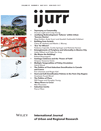Mexico City is a well-known case of urban expansion. Most of the growth has been in its peripheries, occurring during two phases of housing privatization: a predominantly self-built urbanization by residents establishing irregular settlements (starting in the 1930s); and a relatively recent surge of mass-produced small-scale single-family housing built by state-sponsored development companies (underway since the year 2000). Informality, we argue, should not be understood as a mode of housing production setting in opposition self-build practices against industry-led and/or state-sponsored processes, but rather as a dialectical urbanization logic shaped by the entanglements of in/formal processes in governance practices, land privatization and regularization, and urban infrastructure and services deficits. We are particularly interested in a dominant narrative whereby the embeddedness of informality is constantly underplayed and irregular settlements are cast as a residual category, a problem to tolerate or in need of intervention, or the inevitable combination of demographic growth and housing shortage, rather than the direct outcome of urban policies and development processes. Conversely, recent housing policy in Mexico is officially narrated as an economic stimulus, a means to control and order (irregular) urban expansion, and an impulse to democratize homeownership. Our discussion of the entanglements of informality in Mexico City is based on an extended literature review of academic articles and official reports (predominantly in English), supplemented by a series of street and neighborhood explorations (in the summers of 2012 and 2013) across the metropolis.
Details
Written by:
Liette Gilbert and Feike De Jong
Digital Object Identifier (DOI)
10.1111/1468-2427.12249
About DOI

